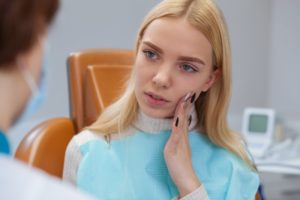
For over a year, the world has been rocked by the COVID outbreak. As a result, several peripheral issues have arisen. Dentists have noticed an influx of dental emergencies from COVID, but why? How can a respiratory virus impact a person’s dental health? As you continue reading, a dentist explains the connection and what you can do to prevent a dental emergency.
The Relationship Between Stress and Dental Problems
According to the Centers for Disease Control (CDC), there has been an increase in the number of people dealing with stress and anxiety since the outbreak of the COVID virus. This is understandable given the many challenges and strains that the pandemic has placed on lives at all levels.
The heightened stress has contributed to an increase in bruxism (teeth grinding). The condition can eventually take a toll on the enamel (the hard-outer layer that covers the teeth) and cause cracked teeth and crowns. Another problem associated with bruxism is temporomandibular joint (TMJ) disorder, which is the painful inflammation of the joints that open and close the mouth.
The Warning Signs of Bruxism or a Cracked Tooth
Often, bruxism occurs while sleeping, so a person may not initially be aware of the issue. Thus, it helps to be on the lookout for such indicators as tense facial and jaw muscles, headaches, jaw popping and tongue indentions.
Some of the warning signs of a cracked tooth are pain when chewing or biting, swollen gums around the injured tooth or sensitivity to hot or cold foods.
Treating Bruxism
One way to avoid a cracked tooth or crown is to seek treatment for bruxism. Of course, you’ll want to act sooner than later, as procrastination has been the key ingredient of many dental emergencies.
Since most bouts of bruxism occur while sleeping, a dentist can custom design a mouthguard that prevents any teeth grinding. Here are some additional measures that can be taken to lower stress levels:
- Counseling
- Morning yoga and stretching
- Starting a new exercise regimen
- Meditation, prayer or breathing exercises
How to Respond to a Cracked Tooth or Crown
If you notice a severely damaged tooth or crown, you should seek immediate care from an emergency dentist. While waiting to receive treatment, try to avoid chewing on that side of your mouth. Next, attempt to stop new bacteria from growing by rinsing your mouth with a saltwater solution. Take an over-the-counter pain reliever like ibuprofen (Motrin, Advil or Aleve) to quiet any discomfort. When you visit the emergency dentist, you can have your oral health restored and receive pointers on how to prevent any future problems.
If you’re fortunate enough to not be experiencing a dental emergency, you have the opportunity to get in for a preventive care visit. Although some people are reluctant to do so because of COVID, it’s important to remember that the threats to your oral health don’t take any days off. Thus, it’s worth being proactive!
About the Author
Dr. Stephen Dean is a graduate of the Medical University of South Carolina. He is well aware of the challenges that COVID has posed to dental health, which is why he offers responsive and effective emergency dentistry. Dr. Dean and his staff maintain a safe, clean and friendly environment at Dean Dental Care, and he can be reached for more information or to schedule an appointment through his website.

